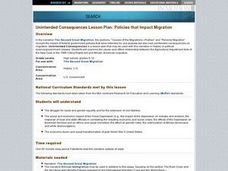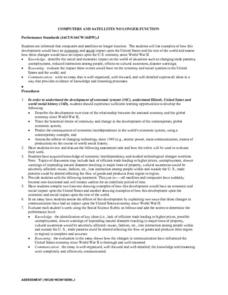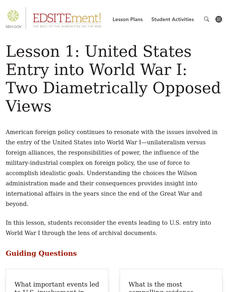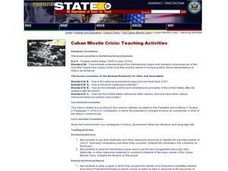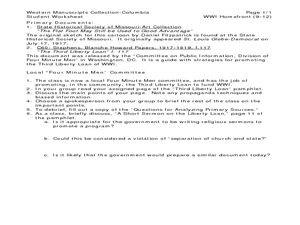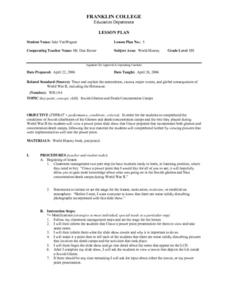Penguin Books
A Teacher's Guide to the Signet Classics Edition of Walden and "Civil Disobedience" by Henry David Thoreau
According to Henry David Thoreau, every citizen must object to unjust laws. The teacher's guide to Thoreau's "Civil Disobedience" begins with a detailed essay synopsis to help readers understand Thoreau's rationale in the challenging...
Curated OER
Milchemet Hamelachim -1
Learners describe how the kings got involved in battle and how the kings developed their alliances. They explain how Sedom and Amora fell into the pits. They identify Biblical words meaning "to fight."
Curated OER
Daniel Shays and the Constitution
Students contrast the diverse views of Connecticut River Valley people in the years before, during, and after the Revolution.
Curated OER
First Nations vs. Euro-Americans
Students analyze primary and secondary source documents to help them describe the cooperation and conflict that existed among the American Indians and new settlers. Then, students analyze the purpose, challenges, and economic incentives...
Curated OER
The Marshall Plan And The Reconstruction Of Europe
Third graders investigate various aspects that are associated with the history of Maryland. They look at the establishment of America as becoming a superpower. They conduct research using the text provided. The students gather the...
Curated OER
Pocumtucks In Deerfield
Students read a story about the Pocumtucks' religious beliefs. Using the text, they discover their concept of land ownership and how they migrated within their territory in different seasons. They use primary and secondary sources to...
Curated OER
Unintended Consequences: Policies that Impact Migration
Students examine the cause-and-effect relationship between the Agricultural Adjustment Acts of the New Deal or the 1965 Voting Rights Act and African-American migration. They write an essay evaluating the effectiveness of the Voting...
Curated OER
Computers and Satellites No Longer Function
They describe the development over time of the relationship between the national economy and the global economy since World War II. They trace the historical forces of continuity and change in the development of the contemporary global...
Curated OER
United States Entry into WWI: Two Diametrically Opposed Views
High schoolers reconsider the events leading to US entry into WWI through the lens of archival documents.
Curated OER
refugees From Vietnam and Cambodia
Tenth graders explore the massive immigration from Vietnam and Cambodia. In this World History lesson, 10th graders examine the crisis that led to this immigration. Students participate in a debate on whether the United States owes a...
Curated OER
Decision Making, Take a Seat or Get off the Bus
Fifth graders explore the positive and negative consequences of choosing to fight against discrimination. They read the story of Rosa Parks. Students discuss the movement against segregation. Students read other books about...
Curated OER
The Atomic Bomb Dilemma
Students examine consequences of using atomic bomb in light of resulting peace, distinguish between fact and opinion and analyze sources to recognize bias and points of view, and assume role of reporter, critic, cabinet member, or...
Curated OER
H4 Homework Assignment #1
In this global studies worksheet, students read the noted pages in their textbooks and then respond to 4 short answer questions about World War I and Russian history.
Curated OER
Samuel's Choice - Social Studies Using Children's Literature
Fifth graders read a book about independence, freedom, and slavery. Students create a story map of the book. They research the causes of the Civil War. Students write a newspaper article from the point of view of an American colonist.
Curated OER
How Was the Inside vs. Outside Paradigm Created?
Students, after listening to a lecture, examine Nigeria from slave trading to the Civil War as well as listen to the Arrested Development song about slavery. In addition, they create a circle diagram for essay #1.
Curated OER
History Repeats Itself
Twelfth graders research historical turning points, gather-data, and extrapolate possible alternate outcomes. They work individually to choose one historical event from Attachment D, Historical Turning Points. Students complete either...
Curated OER
The Ethics of the Bomb: What Would You Do?
Learners research the use of the atomic bomb in WWII, analyze the human costs of dropping the bomb and identify the pros and cons. They develop a PowerPoint presentation on the effects of an atomic bomb dropped on their hometown.
Curated OER
The History of the Holocaust From A Personal Perspective
Young scholars research and identify how Holocaust events affected lives of real people who lived in Europe from 1933 through 1945 and after, and create original artwork, poetry, and essays that reflect understanding of Holocaust, and...
Curated OER
Cuban Missile Crisis: Teaching Activities
Learners create a timeline of the important events of John F. Kennedy's presidency. They construct a timeline of the major events of the Cuban Missile Crisis. They compare the Missile Crisis events with their presentation in the movie...
Curated OER
Anne Frank: 'Everything Changed For Us'
Students discuss the rights that we take for granted, comparing them to the rights lost by the Jews under Hitler. They determine the types of discrimination that led to more acute persecution and explain the impact of majorities and...
Curated OER
Baby Boom and the Culture of the 1950's
Eleventh graders explain the causes, course, and consequences of the United States' role in World War II.
Curated OER
The Road to Democracy
Eleventh graders examine the road to the American Revolution. In this American Revolution lesson, 11th graders read Thomas Paine's works and identify the issues that the colonists had with the British government.
Curated OER
Local Four Minute Men Committee
Learners research the "Third Liberty Loan" pamphlet. In this discussion lesson plan, students read the pamphlet and discuss their opinions. Learners answer questions and discuss main points of the document.
Curated OER
Jewish Ghettos and Death/Concentration Camps
Students trace and explain the antecedents, causes, major events, and global consequences of World War II, including the Holocaust. They assess the conditions of Jewish inhabitants of the Ghettos and death/concentration camps and the...








